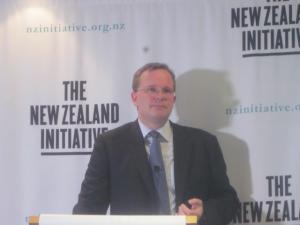EU Will End This Year Declares German Head of Oceania Think Tank
Bungling of immigrant emergency punctures German mystique and leaves EU rudderless
NAPIER, HAWKES BAY, NEW ZEALAND, February 24, 2016 /EINPresswire.com/ -- The European Union during 2016 will cease to exist “as we know it” predicts Oliver Hartwich, the head of the New Zealand Initiative policy group.The immigrant crisis was one too many emergencies for the EU which he portrays as staggering from one crisis to the next. Among these were member countries with covenant-breaking debt to GDP ratios, the Brexit, and the rise of radical politics in the form of populism and nationalism.
Germany meanwhile was reeling from its handling of the immigrant crisis, which now saw the once EU powerhouse “isolated.”
In addition, the officially-driven cover-up of the Cologne refugee assimilation consequences episode had raised questions internationally about the nature of German society’s commitment to open government.
Dr Hartwich (pictured) speaking at a seminar at the headquarters in Wellington of the New Zealand Initiative sheeted the pending demise of the EU “project” to the decision by its leadership after the fall of the Berlin Wall to embark upon an expansionist phase.
This took two perilous forms, he noted, the currency union and the quest for new members. History proved that instead there should have followed a period of “consolidation.”
The revolving door subsequent crises Dr Hartwich identified as “weakening the structure,” of the EU to the point at which it could only focus on its “own survival.”
The New Zealand Initiative sprang from a number of independent enterprise policy groups, notably the Business Roundtable.
Dr Hartwich,a German-trained lawyer and economist was appointed executive director at its inception, following a tour with Sydney’s Centre for Independent Studies, and as chief economist at London’s Policy Exchange.
He noted that the focus by the EU on member financial bail-outs, was obscuring the rise of radical politics in members such as Poland, Slovakia, and Hungary.
The realpolitik exposition on the EU and its future conducted by Dr Hartwich was consistent with the enterprise group’s focus on cutting through doctrines and ideologies in order to dissect and outline events at home and abroad.
Peter Isaac
MSCNewsWire
64 6 870 4506
email us here
Legal Disclaimer:
EIN Presswire provides this news content "as is" without warranty of any kind. We do not accept any responsibility or liability for the accuracy, content, images, videos, licenses, completeness, legality, or reliability of the information contained in this article. If you have any complaints or copyright issues related to this article, kindly contact the author above.

